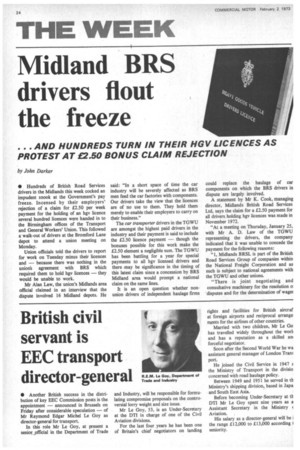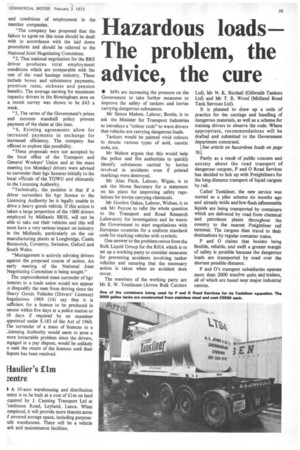Midland BRS drivers flout the freeze
Page 26

Page 27

If you've noticed an error in this article please click here to report it so we can fix it.
. . AND HUNDREDS TURN IN THEIR HGV LICENCES AS PROTEST AT £2.50 BONUS CLAIM REJECTION
by John Darker
• Hundreds of British Road Services drivers in the Midlands this week cocked an impudent snook at the Government's pay freeze. Incensed by their employers' rejection of a claim for £2.50 per week payment for the holding of an hgv licence several hundred licences were handed in to the Birmingham offices of the Transport and General Workers' Union. This followed a walk-out of drivers at the Bromford Lane depot to attend a union meeting on Monday.
Union officials told the drivers to report for work on Tuesday minus their licences and — because there was nothing in the union's agreement with BRS which required them to hold hgv licences — they would be unable to work.
Mr Alan Law, the union's Midlands area official claimed in an interview that the dispute involved 16 Midland depots. He
said: "In a short space of time the car industry will be severely affected as BRS men feed the car factories with components. Our drivers take the view that the licences are of no use to them. They hold them merely to enable their employers to carry on their business."
The car transporter drivers in the TGWU are amongst the highest paid drivers in the industry and their payment is said to include the £2.50 licence payment though the bonuses possible for this work make the £2.50 element a negligible sum. The TGWU has been battling for a year for special payments to all hgv licensed drivers and there may be significance in the timing of this latest claim since a concession by BRS Midland area would prompt a national claim on the same lines.
It is an open question whether nonunion drivers of independent haulage firms could replace the haulage of car components on which the BRS drivers in dispute are largely involved.
A statement by Mr K. Cook, managing director, Midlands British Road Services Ltd, says the claim for a £2.50 payment for all drivers holding hgv licences was made in November 1972.
"At a meeting on Thursday, January 25, with Mr A. D. Law of the TGWU representing the drivers, the company indicated that it was unable to concede the payment for the following reasons: "1, Midlands BRSL is part of the British Road Services Group of companies within the National Freight Corporation and as such is subject to national agreements with the TGWU and other unions.
"There is joint negotiating and consultative machinery for the resolution o 'disputes and for the determination of wages. and conditions of employment in the member companies.
"The company has proposed that the failure to agree on this issue should be dealt with in accordance with the laid down procedures and should be referred to the National Joint Negotiating Committee.
"2, That national negotiation for the BRS driver produces total employment conditions which are comparable with the rest of the road haulage industry. These include bonus and subsistence payments, premium rates, sickness and pension benefits. The average earning for maximum capacity drivers in the Birmingham area on a recent survey was shown to be £43 a week.
"3, The terms of the Government's prices and incomes standstill policy prevent payment of the claim at this time.
"4, Existing agreements allow for increased payments in exchange for increased efficiency. The company has offered to explore this possibility.
"These proposals were not accepted by the local office of the Transport and General Workers' Union and at the mass meeting (on Monday) drivers were advised to surrender their hgv licences initially to the local officials of the TGWU and ultimately to the Licensing Authority.
"Technically, the position is that if a driver surrenders his hgv licence to the Licensing Authority he is legally unable to drive a heavy goods vehicle. If this action is taken a large proportion of the 1000 drivers employed by Midlands BRSL will not be able to take out their vehicles and this will soon have a very serious impact on industry in the Midlands, particularly on the car manufacturing plants at Longbridge, Castle Bromwich, Coventry, Swindon, Oxford and South Wales.
"Management is actively advising drivers against the proposed course of action. An early meeting of the National Joint Negotiating Committee is being sought."
The unprecedented mass surrender of hgv icences to a trade union would not appear .o disqualify the men from driving since the Heavy Goods Vehicles (Drivers' Licences) Regulations 1969 (14) say that it is ;ufficient for a licence to be produced in mrson within five days at a police station or [0 days if required by an examiner ippointed under S.183 of the Act of 1960. rhe surrender of a mass of licences to a Acensing Authority would seem to pose a nore intractable problem since the drivers, :ngaged in a pay dispute, would be unlikely o seek the return of the licences until their lispute has been resolved.
















































































































































